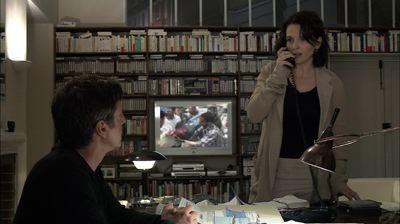Caché

Five minutes into Caché you are still looking at the same unobtrusive city street in a upscale treed neighborhood. The credits crawl across the screen one letter at a time. Why does this feel ominous and forboding, when nothing is actually happening yet? Well that is because you are in the latest Michael Haneke (The Piano Teacher, Time of the Wolf) film, and that is what Haneke does best.
Georges (Daniel Auteuil), his wife Anne (Juliette Binoche) and their son Pierrot (Lester Makedonsky) live happy and are well provided for. They are upper middle-class French liberals who have a house decorated almost entirely with books, and dinner parties with lots of wine and witty French intellectual friends. Georges remarks at one point to his mother that things are well. Even if there are no highs, there are no lows either. The family begins to receive a series of anonymous video tapes dropped off at their front doorstep. On the tapes are images of their house. Nothing is happening (the opening shot of the film) but it is creepy to have someone filming you. They go to the police, but the police won’t do anything until something actually happens. When a video of Georges’ old family home shows up, things get even creepier. First, because the voyeur seems to know something of Georges past and second, because the tape is wrapped in a sheet of paper with a crayon drawing of a face with a smear of red. Georges begins havnig unsettling and violent dreams of himself as a boy witnessing another boy cutting the head off of a chicken. Anne begins to get on edge, not just from the video terrorism, but also because Georges seems to be unwilling to talk with her on the subject. The strain on their formerly bump-less marriage is palpable.
Over the course of its two-hour runtime, Caché, using Haneke’s effective minimalist narrative approach, deals with issues of responsibility, trust, honesty, guilt, blame, terrorism and racism. All of these are shown as personal, but the subtext swims in these issues in the collective cultural sense. It is a savage attack on the archetypical French liberal bourgeois. The film brings a form of terror right to the doorstep in a scene, where Georges and Anne cannot find their son one evening. While their panic rises, on a TV in the background between them, there is news footage of some sort of vague middle-eastern violence with people and children covered in blood. The strain of terror on normal people is transformative and ugly. That most of the impending fear in the film is delivered through means of mass communication, the video and television medium specifically, is a fascinating subject. And Haneke gives it a thorough look, even as we watch from a distant vantage point. A point which is underscored by the final extended shot of the film.
Caché succeeds brilliantly because it manages to keep you on the edge in perpetual apprehension and dread, watching normal folks go about their mundane daily lives with an aura of fear layered over everything. The 9/11 allusions here are impossible to miss, this may just be the best 9-11 film since the Spike Lee’s The 25th Hour. Casual and vindictive acts commited in the past, for whatever reason (or even lack-thereof) come home to roost on Georges, not unlike events with America and the middle east. Make no mistake though, this isn’t some first year college diatribe on the global political climate.
Haneke is equally interested in the characters in this film, particularly Georges transformation of disconnected, aloof liberal to vindictive and harsh conservative. It is a complex transformation and to get into it would involve a lot of spoilers, so suffice it to say, there is a brilliant performance from Daniel Auteuil. Juliette Binoche is relegated to very much a supporting role, but she brings a lot to the table as a woman consumed with fear and feeling any bonds of marriage being stripped away from lack of communication.
There is violence in Caché (one act caused several members in the audience to shriek in horror) and it is, abrupt and chilling, not unlike an act of modern terrorism.

0 Comments:
Post a Comment
<< Home